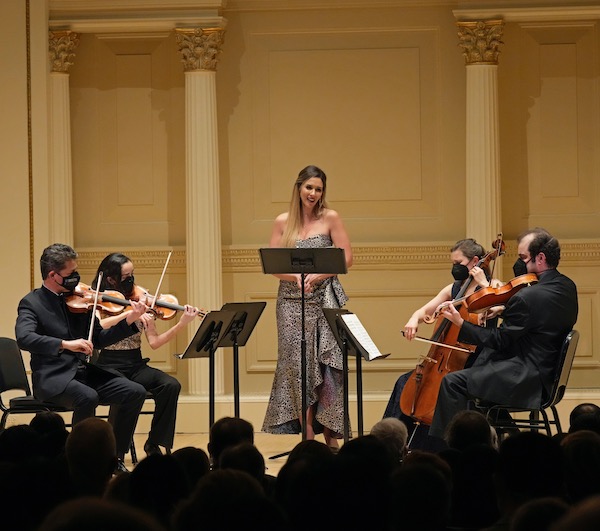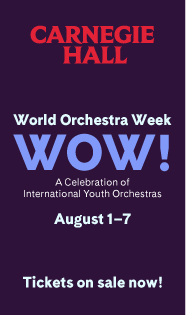A treasurable trio of works served up by Met Orchestra musicians

The Met Orchestra Chamber Ensemble returned to Weill Recital Hall for the final of its three winter concerts. In her brief remarks to the audience, cellist Julia Bruskin said that the Met musicians consider Carnegie Hall their second home. That is a boon for chamber music fans, as every opportunity to hear these marvelous musicians play repertoire removed from their regular fare at the Metropolitan Opera is one to treasure.
Any of the three works on the program—Resphigi’s Il tramonto, Schoenberg’s Verklärte Nacht and Mozart’s Clarinet Quintet—would be a draw on its own. Together, they united to form a program that was charged with emotion: tragedy in the Mozart, rapture in the Schoenberg and bliss in the Mozart. The latter perhaps bubbled with more exhilaration than usual, as Anton Rist, the Met’s new principal clarinetist, had become a father a few days earlier.
Resphigi had an affinity with the poems of Percy Bysshe Shelley and the extremes of ecstasy and despair that he poured into them. In 1914, Resphigi was still heartbroken after the end of a tumultuous love affair. Working on ll tramonto, his Italian setting of Shelley’s poem “The Sunset” for mezzo-soprano and string quartet, provided the composer with a diversion. The voice of his confidant and muse, mezzo-soprano Chairina Fino-Savio, for whom he composed the work, gave him a measure of solace.
There is passion and moments of exquisite beauty in the Respighi, but it remains a tragic tale. A young woman, having spent an enraptured night with her lover, awakes to find him dead. She neither dies nor grows wild with grief, but lives on to tend her father in his old age. The gentle woman’s only protestation was a single word — “Peace” — for only in death would she find respite from her grief.
Tamara Mumford was the soloist. Since her 2006 Met debut as Laura in Verdi’s Luisa Miller, the mezzo-soprano has sung more than 140 performances with the company (and is scheduled to sing the role of Dryade in Strauss’s Ariadne auf Naxos in March). Mumford illuminated the work’s delicate emotions with the deftest of vocal colorings and her keen sense of drama.
When she sang of the couple strolling through the fields, Mumford’s voice was warm and rich. A short while later, it became deathly pale, as the young man spoke of the tomorrow that would never come. Resphigi echoed these moments in the instruments, especially the violin, where Bruno Eicher’s playing was as eloquent as Mumford’s singing.
It was a far different range of emotions associated with love that inspired Schoenberg to compose Verklärte Nacht, a string sextet in one movement dating from 1899. Schoenberg was not only attracted to the poet Richard Dehmel’s erotically charged and physiologically complex poetry, but he had also met Mathilde von Zemlinsky, the sister of his teacher Alexander von Zemlinsky, whom he would later marry. In such a state of heightened emotion, Schoenberg composed what was to be his first important work.
Verklärte Nacht is a setting of Dehmel’s poem of the same name in which a man and a woman meet in a secluded wood. The woman has a secret; she is pregnant with the child of another man. Rather than denounce and reject her, however, he tells her that the unborn child will be transformed by their love into his very own. Anxiety is replaced by ecstasy in Schoenberg’s musical realization of the scene.
This was a luminous performance that simmered with sensuality and passion. A striking feature of the work its conversational tone, which in particular found expression in violinist Daniel Khalikov and cellist Julia Bruskin’s lively and expressive playing. The tension that coursed through the piece was ultimately transformed into sounds of transcendent beauty in its final measures, leaving the audience transfixed and silent long after the final notes had been played.
Mozart composed his Clarinet Quintet in 1789 for Anton Stadler, a member of the court orchestra in Vienna, as well as his friend and fellow Mason. He was not alone in his admiration of the singing quality and beautiful tone of Stadler’s playing.
Anton Rist produced beautiful sounds from his clarinet, but it was his phrasings that gave this performance its lightness and grace. Those fleeting moments when he just lightly touched the highest notes in a phrase and then descended effortlessly into the warm lower range of his instrument were just lovely. There was plenty of virtuosity on display, as well as high spirits in the Minuet, but it was Rist’s sensitivity as an artist that left such an impression.
As in the Schoenberg, it was again the conversational nature of the performance that was so striking. Violinist Miran Kim and cellist Kari Jane Docter engaged in a light-hearted musical banter that enlivened the entire work. In the finale, violist Zoë Martin-Doike, also impressed with her incisive playing and vibrant tone.
The Met Orchestra Chamber Ensemble returns to Carnegie Hall on June 9.
